ALEKSEI ON SCREEN:
Tsarevich Aleksei
(Lenfilm, 1996)
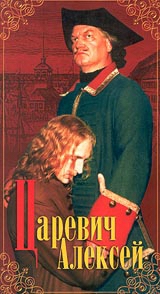
This film is partly based on Merezhkovskii's fin-de-siecle play and novel, so is not a strictly 'historical' historical - It takes some liberties, but fewer than Hollywood probably would. It also has the integrity at the beginning to announce itself as "A Version" of events - not pretending to be "the definitive true story'. The Merezhkovskii influence means Evfrosin'ya doesn't get a sympathetic reading (unhistorically, she gives her and Alyosha's refuge away by having a fling with a chap who turns out to be a Tolstoi agent in disguise!), but it is a refreshing change to see Alyoshen'ka as the hero, considering his previous hostile cinematic incarnations - a turning point in his career as a film character! Possibly it errs in the same way that George Macdonald Fraser said the portrayal of Robert Bruce did, in his lambasting of the execrable Braveheart, by suggesting Peter had a conscience, but then, this is another Merezhkovskii borrowing.
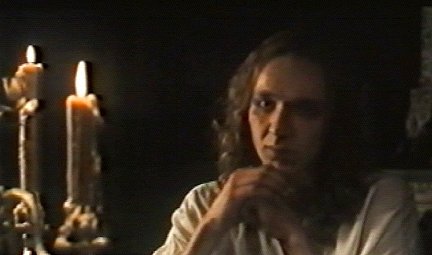
The opening shots are straight out of Valentin Serov's painting Peter I at a Construction Site: Pete driving along on a sled, eyes bulging, moustache bristling, and lash in hand, while peasants throw themselves on the snow as he passes. The use of authentic period locations works well. The costumes are beautiful, and the use of real palaces pays off in terms of atmosphere. For connoisseurs of ludicrous Baroque wigs, Menshikov, Tolstoi & co. seem to be wearing whole dead sheep, which is exactly as it should be, of course! I'm not surprised the film won awards for design and costume & c. Some of the shots look like old paintings - I think especially of the scene where Peter drops by when our young hero is under house-arrest, to find him sitting alone at a candle-lit table in a darkened room: Aleksei explains it's "a funeral supper for his murdered friends". The Ehrenburg and Naples episodes are run into one, I think because of budgetary considerations (Russian film-making being financially squeezed as it is): Italy is cut altogether.
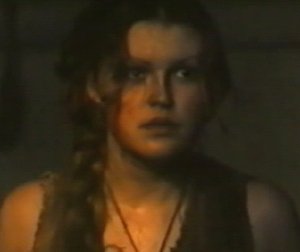 |
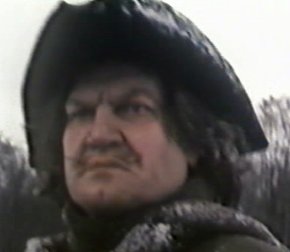 |
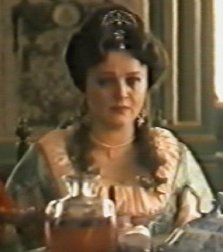 |
|
Afrosin'ya (Ekaterina Kulakova)
|
Peter (Viktor Stepanov)
|
Ekaterina (Natal'ya Egorova)
|
The performance by Aleksei Zuev as Alyosha was v. touching - he strikes me as a Russified Paul McGann in appearance - all eyes and cheekbones and long, wavy hair, but not as swarthy as the original. (Alyosha's paternal grandmother's family were of Tatar origins, and he had dark hair, brown eyes, and sallow complexion.) The film is honest enough to portray him as frequently drunk (but in Petrine Russia, that was not in itself a major issue: Pete's own alcohol intake was considerable!), but his sensitivity and intelligence came through, also the painful psychology of the fact that a child will still, at some level, love the parent who has abused him. No hint of the tubercular cough, though the actor is suitably gaunt. (I always picture Alyosha sloping around, holding his cherry-coloured silk handkerchiefs - inventoried among his belongings - to his lips to hide the blood...)
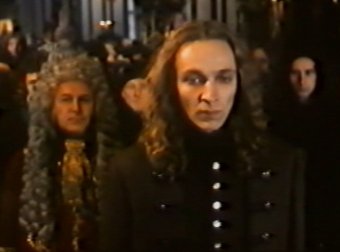 |
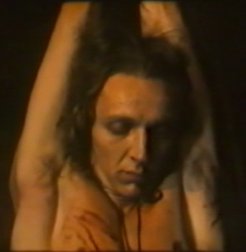 |
|
Alyosha renounces his claim to the throne
|
...but it does not save him
|
It does at least break some taboos by showing Pete wielding the knout in person - and being told by the professional torturer to back off because he's an amateur and doesn't know what he's doing! (Pete is, of course, applying the lash to Aleksei's fragile body with more vigour and enthusiasm than concern that he should still leave his son in a condition to answer questions...!) When the torturer then says "Fetch the doctor!", yours truly has no qualms about wanting to burst through the screen, cut the ropes, throw the poor boy over her shoulder and save him! Major incitement to h/c... You later see Tolstoi making the dying boy sign a confession - his arms and hands heavily bandaged, having been dislocated by being strung up from the ceiling while flogged...
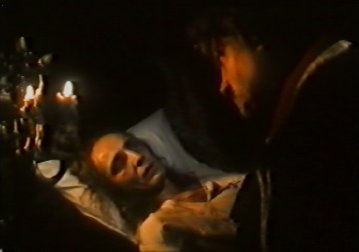
The film turns again to Merezhkovskii in depicting a deathbed reconciliation with Peter, but that doesn't blunt the impact of the preceding brutality. The viewer still thinks of Pete, "So you're feeling sorry for yourself now - well, tough!"
Return to Top

Manuscripts don't burn...







